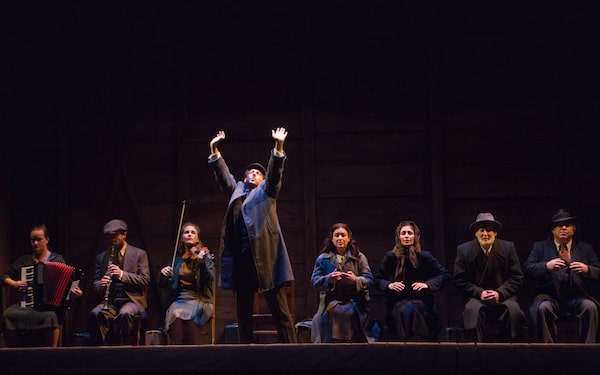
Sarah Orenstein, Nicholas Rice and Jessica Greenberg in Studio 180 Theatre’s production of Indecent.Cylla von Tiedemann/Supplied
- Title: Indecent
- Written by: Paula Vogel
- Director: Joel Greenberg
- Actors: Matt Baram, Jonathan Gould, Jessica Greenberg, Tracy Michailidis, Dov Mickelson, Sarah Orenstein, Nicholas Rice
- Company: David Mirvish presents a Studio 180 Theatre production
- Venue: CAA Theatre (formerly the Panasonic)
- City: Toronto
- Run: To Nov. 6
Indecent is a play with an unusual protagonist: Another play.
This 2015 semi-documentary drama with musical interludes chronicles the life and times of God of Vengeance, an early stage sensation by the Yiddish-language writer Sholem Asch.
Written by the Pulitzer Prize-winning American playwright Paula Vogel, Indecent follows that controversial play’s production history from its very first reading in a salon in Poland in 1906, through its initial international success in cities such as Berlin, St. Petersburg and Constantinople, to a Broadway debut that was shut down by the vice squad in 1923, and then beyond.
God of Vengeance shocked some North American audiences with its depiction of a loving lesbian romance – including an on-stage kiss; in this play, however, we mainly see its Jewish opponents who fear it for other reasons.
Even at its very first reading, Asch (Jonathan Gould) is told by a fellow Jewish writer to burn the script because of its setting: a brothel run by a Jewish religious hypocrite.
“Why must every Jew on stage be a paragon?” Asch responds. He doesn’t believe it is bad for his people to be depicted as equally flawed as any other people in the world – in fact, he believes it might be good for some gentiles to see the complex humanity they share with the Jewish people.

Indecent chronicles the life and times of God of Vengeance, an early stage sensation by the Yiddish-language writer Sholem Asch.Cylla von Tiedemann/Supplied
This is an aesthetic-political argument that played out time and time again in Jewish communities worldwide over the course of the 20th century (in Canada, for instance, in relation to Mordecai Richler’s novels). And, of course, there are parallels in the push-and-pull between positive or joyous and “indecent” representations of other racial or ethnic or minority groups in plays, TV show and films to this day.
One of the fascinating arcs in Indecent shows how Asch, who eventually immigrates to the United States, stops being a strong supporter of the script he once fought to get produced uncensored. Part of this is because of the PTSD that follows his participation in a mission to investigate pogroms in Eastern Europe in the 1920s, part of it is the inevitable alienation of an aging artist to his early work.
But God of Vengeance is, indeed, the main character here and has a complex life of its own beyond its author. It belongs to others as much as Asch. We see how a scene he wrote showing same-sex love thrills a pair of lesbian actors (Jessica Greenberg and a particularly touching Tracy Michaildis) who are finally able to bring their whole selves to the stage, and how the beauty of the writing inspires the unworldly small-town Polish Jew Lemml (Matt Baram) to become a stage manager and follow the play around from country to country over decades.
Baram is the only actor who plays a single character. The other six performers (plus three musicians) in this Studio 180 production, now on at the CAA Theatre as part of the Off-Mirvish season, cycle through characters, playing thespians in various productions of the play, and those who support or oppose it such as a rabbi who tries to get a New York run shut down, or a producer who censors scenes in the name of the god of box office, or, in one memorable scene, Eugene O’Neill. (That Irish-American playwright is also played by Gould, with delicious verve.)
Given Indecent’s action takes place in many different languages, Vogel has set up a convention where English is mostly spoken on stage, but surtitles and the absence or presence of accents indicate to the audience what language the characters are really speaking in any given moment.
This allows for a complex exploration of what it is to be an “audible minority” in the arts, as, for instance, one of the lesbian actors who finds herself allowed to show her sexuality on stage subsequently has to try to cover up her Jewishness in the form of a Yiddish accent to appeal to uptown audiences.
There’s also a framing device to Vogel’s play – her show about a show is supposedly being performed by a six-actor troupe featuring a pair of ingenues, a pair of actors in their prime, and two senior actors, who rise from the ashes in the first scene.
This doesn’t really register in director Joel Greenberg’s production at all, however; the casting is not along the prescribed lines – and you never get the sense of a consistent identity underneath all the performances.
Despite that lack of an extra layer and a few other curious flaws in the direction (the kiss that shut down the show on Broadway was not visible from where I was sitting), Indecent is always fascinating and, in this Toronto premiere, ultimately moving.
Vogel has written a drama about a drama, yes – but it is also a dramatization of the Jewish experience of the first half of the 20th century from a fresh and unusual angle.
The decline and then disappearance of the vibrant Yiddish-language theatre scenes in cities in Europe and North America are often seen as an inevitable consequence of assimilation. But as Asch, as an old man, says near the end of the show to a young director who wants to revive in play in the 1950s, he has lost his audience for another reason: “Six million have left the theatre.”

Cylla von Tiedemann/Supplied